U.S. Department of Commerce Invests $1 Million to Establish New Aviation and Engineering Research Center in Florida
A new project at Embry-Riddle Aeronautical University, funded by a $1 million grant from the U.S. Department of Commerce through its Economic Development Administration (EDA), is expected to create 387 new jobs and spur $1.6 million in private investment.
On Dec. 11, U.S. Secretary of Commerce Wilbur Ross announced that a $1 million award to Embry-Riddle will be used to establish a new aviation and engineering research center in Florida.
Specifically, the grant will “help build the Applied Aviation and Engineering Research Hangar in Volusia County,” the U.S. Department of Commerce reported in an official news release.
The new facility will serve as the new home for Embry-Riddle’s Eagle Flight Research Center, a hub for engineering research and development.
“Embry-Riddle has a 90-year legacy of innovation, and our research is shaping the future of human mobility,” said University President Dr. P. Barry Butler. “We are pleased and honored to receive this research award to advance innovation, economic development and job growth in Florida.”
Secretary of Commerce Wilbur Ross said: “This project is the product of local leader’s efforts to spur economic opportunities in Volusia County. “The completion of this project will help strengthen the region’s aeronautical sector, making the community a potential destination for both domestic and foreign investment.”
The Commerce Department news release continued: “The Eagle Flight Research Center will help to foster innovation in the state’s aeronautical cluster and increase its attractiveness to the private sector. This project was made possible by the regional planning efforts led by the East Central Florida Regional Planning Council. EDA funds the East Central Florida Regional Planning Council to bring together the public and private sectors to create an economic development roadmap to strengthen the regional economy, support capital investment and create jobs.”
Established in 1998, the Eagle Flight Research Center continues to guide aviation technology into the future. “Our continuing research will encompass aviation innovation projects such as alternative propulsion systems, electric and hybrid-electric aircraft, and electric vertical takeoff and landing, or eVTOL aircraft, as well as new fuels,” said Center Director Richard “Pat” Anderson.


